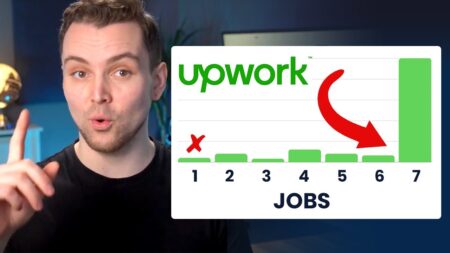Demand for freelance programmers will only grow in the following years. This situation encourages many to quit their corporate jobs and join the global labor market as a freelance programmer.
Billions of people spend many hours a day in front of their phones and laptops. They are using a variety of apps for so many different purposes – education, entertainment, communication, navigation, and much more. All of these apps were created by programmers.
Therefore, in a way, we can say that the world’s technology currently runs thanks to programmers.
We dedicated this article to programmers that already work independently or aspire to be, and how you can take additional steps to become a successful freelance programmer.
Money Note: If an extra $1K–$5K/month would change your 2026 goals (debt, savings, travel, freedom), you’ll want to catch this: free live workshop from a freelancer who’s earned $4M+ online. No fluff. No gimmicks. A real roadmap. 👉 Watch the training or save your seat here »
- To get freelance programmer jobs, develop a strong portfolio of your work.
- Look for job opportunities on freelancing websites and through networking.
- Consider specializing in a specific programming language or niche—and then charge more for your expertise.
Who is a freelance programmer?
A freelance programmer essentially does the same coding and app development job they would do for a company. This includes creating websites (back-end or front-end development), software and apps for various platforms, etc.
Being a freelancer includes some additional chores, such as:
- Constantly looking for new clients and projects
- Do your own marketing
- Figuring out the paperwork and paying taxes
On the other hand, as a freelance programmer, you get to enjoy the following perks:
- Flexible working hours
- Be your own boss
- More freedom to choose the types of projects.
Programmers usually start as company employees and then start freelancing on the side. In time, if their clients are satisfied, they build their portfolio and their reputation. Once they feel confident with their client base, they can go full-time freelancing.
Of course, everyone has their own story, and this path doesn’t have to be the same for you.
Therefore, as for any other profession, freelancing is a process and takes some time, endurance, and dedication. It can be tricky at the beginning because the inflow of tasks might not be consistent.
Also, depending on your personality and habits, it might be challenging to be your own boss at first. Although flexible, freelancing does require some discipline and lots of responsibility. The good news is that this is only a matter of practice. If you decided to make a living out of freelance coding, this shouldn’t be a hassle at all.
Is it profitable to be a freelance programmer?
Another perk of being a freelance programmer is that it’s probably one of the most lucrative professions at the moment.
It is hard to say how much you would earn as a developer. The exact amount will depend on your previous experience, your skills, and your negotiation. Besides, this income might vary from one month to another.
In the U.S. for example, freelancing is worth it — on average, most freelance programmers earn around $60,000 on a yearly basis. This amount translates into $50-$60 hourly rates.
In general, there are two ways freelance programmers get their salaries: per hour or per project.
Freelancers usually prefer time-based salary, as it is more transparent and resembles the certainty of corporate work. However, being paid per project can sometimes bring larger amounts. In any case, it is a matter of preference and agreement with the client.
What are the typical freelance programmer tasks?
A freelance programmer is a specialist in writing, testing, and maintaining programs. In other words, they are computer language interpreters. The programmer translates human commands into a code the machine can understand and perform.
Anything a computer does needs some type of coding in order to work. That means freelance programmers have a great variety of options and niches to specialize in.
Programmers can either work in existing languages (C++, Python, Javascript, to name only a few) or create one for particular projects.
It is a prosperous profession, perfect for those ready to spend a lot of time in front of a computer screen. Introverts love programming because the technology empowers their quiet personalities. Freelancing, in general, provides many jobs for introverts.
13 Steps to become a freelance programmer
A freelance programmer’s journey is never linear. There are ups and downs, and you work with many clients at the same time. Also, if you want to thrive as a freelancer, there are three sets of skills you should focus on:
- Earn the status as a professional in your field
- Develop soft skills
- Learn marketing strategies
Now, let’s examine which steps you need to take in each of these domains to successfully start your freelance undertaking.
Become a professional
Being able to get the job done is, of course, an indispensable condition for being a successful freelance programmer. To do that, you want to do the following.

1. Learn the necessary programming languages
It goes without saying that you can’t be a programmer if you don’t know any programming language. In fact, most programmers are able to work in several languages. As “programming polyglots,” they can perform a much wider range of tasks, so it is much easier for them to find a job.
You can learn coding by obtaining a university degree, but there are many good quality courses as well, both online and in-house.
2. Volunteer for open-source projects
Working for open-source projects might not bring a lot of money, but it can bring some other values. As a volunteer, you will have an opportunity to work with professionals. This experience could bring much value later on.
Also, in the process, you will expand your network. You might make connections that will provide you with important information or even help you get new clients.
Clients value people who are passionate about what they do. Having an open-source project in your portfolio proves that and boosts your credibility.

3. Find a niche
Although, in essence, all programming is the same, there are significant differences among platforms, preferred coding languages, business needs, etc. Therefore, freelance programmers tend to pick an industry that they find exciting or lucrative (or both).
It might seem counterintuitive that if you serve only a particular type of customer, you will actually have more job offers. Yet, it is true.
Saying no to those projects you can perform only moderately well might temporarily leave you without a job. However, you will remain available for those projects you can rock.
4. Decide on pricing
Finding the proper ratio between the actual quality of your services and the amount your clients are willing to pay is not simple. As a beginner, you can’t charge as if you are a seasoned professional.
On the other hand, if your prices are too low, it might signal your clients that you don’t appreciate your own work.
Develop soft skills
There are freelance programmers who are brilliant in what they do, but they mess things up when it comes to communication and teamwork. In order to avoid unnecessary conflicts and losses, here are some tips.
5. Be responsive
After some time working remotely, we tend to forget that there are people behind emails. They have their busy schedules as well, and they shouldn’t wait for your reply for ages. Even if you can’t do what they are asking, let them know. Respectful conduct is something clients remember very well.
In case of conflicts, always choose the moderate approach. Stay professional and calm at any cost. Silent treatments, passive aggression, or, even worse, insults have never made anything better.
6. Embrace (remote) teamwork
Even if you are a freelance programmer and work from your living room, expect to collaborate with other people. Since you are a freelancer, that also means you will communicate with them online.
Therefore, learn to notice teamwork culture and adapt to it, even if you don’t like everything about your teammates.
7. Be transparent
While teamwork requires us to adapt to others, transparency is about being clear about our own boundaries. It means being explicit about what you need to feel comfortable working for the project.
Also, being transparent means letting your client know in advance about any difficulties, delays, or concerns.
8. Regularly check in with yourself
Freelancing is great, but it also means you can’t just get up at 5 p.m. and go home, leaving work for tomorrow. You are your own boss but also your primary resource. Therefore, it is vital to stay in touch with your needs and take good care of your health.
You should constantly observe your productivity and habits, noticing what works for you and what should be eliminated. Do you work better in the morning or in the evening? Which type of music makes you focus? These are all small things but can have a significant effect on your well-being.
9. Learn, learn, learn
There is a crucial thing a freelance worker should understand. You have to constantly work on improving your skills, even when there is no income.
Freelancers use the so-called “dead seasons” when they don’t have any projects, to dedicate to courses and webinars to boost their competencies.
Marketing strategies
Since you have to make your clients aware of your work, you must be familiar with some marketing basics.
10. Create a portfolio
Creating a portfolio is much more than putting some of your best work on display. Every single detail about it counts. Programmers spend weeks making their portfolios perfect.
As a programmer, you can easily create your portfolio website. In case you do that, make sure to optimize the website’s content according to SEO recommendations. Clients often look for freelancers on Google.
Make sure to respect your past client’s privacy and keep any copyrighted materials out of the portfolio. It shows to your future clients how respectful you are to the previous ones.
11. Create a profile on freelance platforms
It will be exceedingly easier to work as a freelancer if you have a profile on major freelance platforms such as Fiverr, Upwork, and similar. Potential clients who need a freelance programmer utilize these sites.
Remember that beginning in places like this always takes some time. On the bright side, setting up your profile in a professional way, with all necessary details, references, and portfolio, will help you show your future clients what you’re made of.
12. Activate your network
Every honest marketer will tell you the same: there is no better advertisement than word of mouth. Former clients, colleagues, and acquaintances working as freelance programmers know your programming skills very well. Feel free to reach out to them for referrals and recommendations.
13. Cold outreach
Cold outreach can be quite time consuming, but it can land you major clients. Although cold calling is an option, the most common form of cold outreach is via email. You can use some customer relationship management (CRM) tools to help you automate the process.
Most Popular Freelance programmer jobs
The list of freelance programming jobs you can get as a programmer is very long. As a beginner, you can consider the following positions:
- Front-End or Back End developer
- UX/UI Developer
- Software application developer
- Database administrator
- Software quality assurance (QA) engineer
- Business intelligence analyst
- Network system administrator
- Cloud Engineer
- Machine and Deep Learning Engineer
To help find these jobs, check out SolidGigs — they do the job hunting for you, so you can use your time coding instead.
Final Thoughts
Becoming a freelance programmer will put your determination and endurance to the test. Starting as an independent worker can be challenging at first, as you will need to do a variety of other tasks apart from your main freelance coding jobs.
But once you figure out your pricing, ways of promotion, and expertise, you can expect to reap the fruits of your efforts.
Keep the conversation going...
Over 10,000 of us are having daily conversations over in our free Facebook group and we'd love to see you there. Join us!




